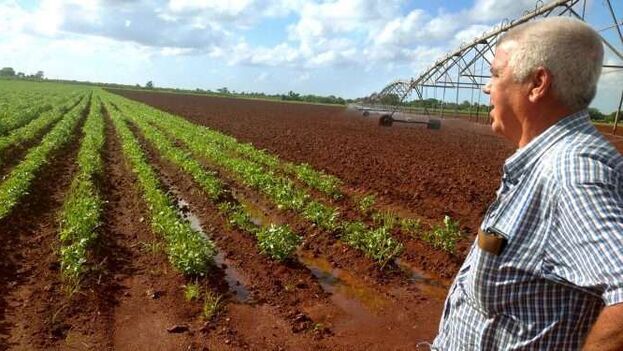
![]() 14ymedio, Havana, December 15, 2022 — The authorities of Artemisa Province have recognized that they had to destroy more than 82 acres of potatoes in Alquízar, which spoiled due to the lack of irrigation caused by the blackouts of the last months. This is indicated in a report published this Wednesday in El Artemiseño, which, however, attacks 14ymedio, the first newspaper to report on the situation of the potato crop.
14ymedio, Havana, December 15, 2022 — The authorities of Artemisa Province have recognized that they had to destroy more than 82 acres of potatoes in Alquízar, which spoiled due to the lack of irrigation caused by the blackouts of the last months. This is indicated in a report published this Wednesday in El Artemiseño, which, however, attacks 14ymedio, the first newspaper to report on the situation of the potato crop.
As this newspaper revealed on November 28, from the residents of the area themselves, the cuts in electricity required a change in the irrigation cycles, which damaged a large part of the crop in the Cuba-Mexico Friendship Cooperative of Agricultural Production. Specifically, of the planting of 398 acres, divided into four quadrants, three of the potato crops spoiled.
In addition, the locals reported that the rotting potatoes didn’t let them breathe.
For this reporting, el Artemiseño described 14ymedio — a newspaper censured by the regime and to which there is no access from the Island without VPN — as “fake news that flies the flag of serious journalism.”
“In search of the truth, a group from the newspaper [El Artemiseño] went to the area affected, which didn’t smell at all,” says the report of the official newspaper, without clarifying that their visit took place more than two weeks after the report by 14ymedio.
Similarly, El Artemiseño, citing sources of the regime and blaming the United States embargo, criticizes: “Those who call themselves ’speakers of the truth’ omitted in their report the damage caused by the blockade to the agriculture and energy sectors, whose losses amount to more than 270 million and 185 million dollars respectively, just between August 2021 and February 2022.”
The publication acknowledges, however, the destruction of the crop and points out: “We did know that before proceeding with the demolition of the planting, the residents of the area were allowed to enter the field to take advantage of everything possible for animal feed.” And it concedes that in the text of this newspaper “one thing bordered on reality: the energy deficit played a part.”
Quoting Fernando Ravelo Jaime, president of the cooperative, El Artemiseño said: “Five days after planting, the potato must be lightly watered and then maintain a stability between 200 and 300 cubic meters so that it germinates and does not rot under the earth.” To irrigate one quadrant, with 27 acres, he continues, “you need 18 to 20 hours of stable flow, at 250 cubic meters. That is, it was taking 80 hours to irrigate four quadrants, which was not possible.”
The result was that “only 60% of the potatoes germinated.” Officials told the official newspaper that “only after really knowing the magnitude of the problem did crop protection measures begin to be adopted.”
Now, of 205 acres planted with national seed, the newspaper says, “there are 124 standing.” In the “damaged area, high-yield corn was planted that should provide about 74 tons per acre,” which, it explains, “allows taking advantage of the fertilized soil to harvest the tender grain in the same period that the potatoes would have needed to sprout.”
El Artemiseño points out that the director of the Electric Company has assured it that this type of incident will not be repeated, because “today the situation in the country is different, due to the increase in the maintenance of thermoelectric power plants and the diesel and fuel generators, which allow between 21 and 22 hours a day of electricity in the province.” With this guarantee, the local newspaper prophesies that “Alquízar will not stop sowing the 420 acres it has planned for the campaign. The seed is in the municipality and the sowing is ready in another machine.”
Translated by Regina Anavy
____________
COLLABORATE WITH OUR WORK: The 14ymedio team is committed to practicing serious journalism that reflects Cuba’s reality in all its depth. Thank you for joining us on this long journey. We invite you to continue supporting us by becoming a member of 14ymedio now. Together we can continue transforming journalism in Cuba.
